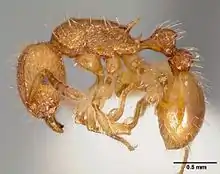Tetramorium insolens
Tetramorium insolens is a species of ant in the genus Tetramorium.[1] It is a medium-sized orange ant that is mainly seen on vegetation, has a monomorphic work caste with 12-segmented antennae, three-segmented antennal club, short antennal scapes that do not surpass the posterior margin of the head, a gradually sloped mesosoma, and strong propodeal spines. It has two waist segments and a gaster with a stinger.[2]
| Tetramorium insolens | |
|---|---|
 | |
| Tetramorium insolens worker | |
| Scientific classification | |
| Domain: | Eukaryota |
| Kingdom: | Animalia |
| Phylum: | Arthropoda |
| Class: | Insecta |
| Order: | Hymenoptera |
| Family: | Formicidae |
| Subfamily: | Myrmicinae |
| Genus: | Tetramorium |
| Species: | T. insolens |
| Binomial name | |
| Tetramorium insolens (Smith, 1861) | |
The species lives primarily and natively in the Pacific Island region,[3] with an invasive and non-native yet established presence recorded in Austria, Hungary, France, and the Netherlands.[4]
References
- Bolton, B. (2015). "Tetramorium insolens". AntCat. Retrieved 31 January 2015.
- "Species: Tetramorium insolens". AntWeb. Retrieved 12 January 2016.
- "Tetramorium insolens". PIAkey: Identification Guide to Invasive Ants of the Pacific Islands. Retrieved 12 January 2016.
- "Species Factsheet: Distribution". Delivering Alien Invasive Species Inventories for Europe. Retrieved 12 January 2016.
This article is issued from Wikipedia. The text is licensed under Creative Commons - Attribution - Sharealike. Additional terms may apply for the media files.